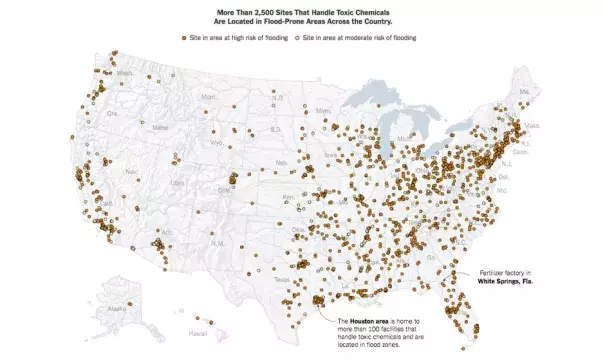Maps: Toxic Chemical Sites at High or Moderate Risk of Flooding

Anchored in flood-prone areas in every American state are more than 2,500 sites that handle toxic chemicals, a New York Times analysis of federal floodplain and industrial data shows. About 1,400 are located in areas at highest risk of flooding.
As flood danger grows — the consequence of a warming climate — the risk is that there will be more toxic spills like the one that struck Baytown, Tex., where Hurricane Harvey swamped a chemicals plant, releasing lye. Or like the ones at a Florida fertilizer plant that leaked phosphoric acid and an Ohio refinery that released benzene.
Flooding nationwide is likely to worsen because of climate change, an exhaustive scientific report by the federal government warned last year. Heavy rainfall is increasing in intensity and frequency.
At the same time, rising sea levels combined with more frequent and extensive flooding from coastal storms like hurricanes may increase the risk to chemical facilities near waterways.
The Times analysis looked at sites listed in the federal Toxic Release Inventory, which covers more than 21,600 facilities across the country that handle large amounts of toxic chemicals harmful to health or the environment.
Of those sites, more than 1,400 were in locations the Federal Emergency Management Agency considers to have a high risk of flooding. An additional 1,100 sites were in areas of moderate risk. Other industrial complexes lie just outside these defined flood-risk zones, obscuring their vulnerability as flood patterns shift and expand.
The presence of chemical sites in areas vulnerable to flooding is a holdover from an age where the advantages to industry of proximity to rivers and oceans — for transportation and trade, or for a ready supply of cooling water — seemingly outweighed the risks.
“Waterfronts are changing as a result of sea level rise,” said Jeanne Herb, an environmental policy expert at Rutgers University who has researched hazards posed by climate-related flooding to industries in New Jersey.
...


